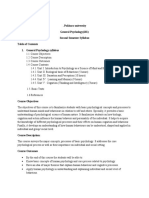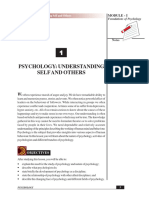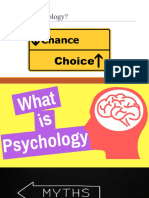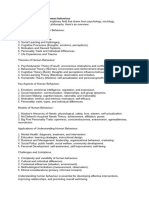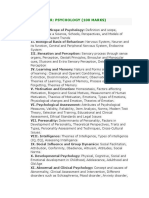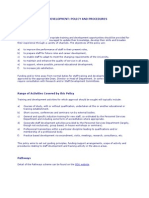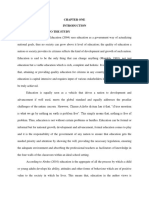Psy C211 491
Psy C211 491
Uploaded by
suryaCopyright:
Available Formats
Psy C211 491
Psy C211 491
Uploaded by
suryaOriginal Description:
Original Title
Copyright
Available Formats
Share this document
Did you find this document useful?
Is this content inappropriate?
Copyright:
Available Formats
Psy C211 491
Psy C211 491
Uploaded by
suryaCopyright:
Available Formats
BIRLA INSTITUTE OF TECHNOLOGY AND SCIENCE, PILANI
INSTRUCTION DIVISION
II SEMESTER (2015- 16)
Course Handout (Part-II)
Date: November 16, 2015
In addition to part I (General Handout for all courses appended to the time table) this portion gives specific details regarding the
course.
Course No.
: PSY C211
Course title
: Introductory Psychology
Instructor-in-charge
: Santosh Mahapatra
Scope and objective of the course: To develop a conceptual framework for understanding the human behavior; relevance
of psychology in daily life and its application in social, educational, industrial, personal and other spheres.
Course Description : The development of psychology as a science individual and the environment; Nature, kinds and
determinants of Perception; Biological bases of behaviour; Consciousness; Motivation; Emotion; Modification of behavior
through learning; Memory and forgetting; Thought processes, Problem solving and Creative thinking; Individual differences
Intelligence, Gender, Personality, Stress and coping; and Social thought and Social Behavior.
Text Book:
T1. Robert A. Baron, Psychology, Revised 5th Edition, Pearson, 2009
Reference Books:
R1.Ceccarelli & Meyer, Psychology, South Asian Edition, Pearson Longman, 2006
R2. A. K. Singh, Tests, Measurements and Research Methods in Behavioural Sciences, Revised 4th
Edition, Bharati Bhawan, 2009
Course Plan:
S. No. Title of the Chapter
Learning Objectives
Reference in
Book
1
Psychology: A Science & Modern Psychology: Definition, Origin, Classical Studies,
T1: Chapter 1
Perspective
Issues and Perspectives, Trends, Psychology in India,
Overview of Research Methods in Psychology
2
Biological Bases of
Nervous System: Neurons as Building Blocks, Basic
T1: Chapter 2
Behavior
Structure and Functions, The Brain; The Brain and
(40- 81)
Human Behavior; Heredity and Behavior: Genetics &
Evolutionary Psychology
3
Sensation & Perception: Sensation: The Raw Materials for Understanding; Vision;
T1: Chapter 3
Making Contact with the Hearing; Touch, Smell and Taste; Perception; The
(82- 127)
World around us;
Plasticity of Perception, Extrasensory Perception
RA^
Cognition: Thinking,
Deciding &
Communicating
States of Consciousness
Thinking: Forming Concepts and Reasoning to
Conclusions; Making decisions; Problem Solving;
Language: The Communication of Information
Biological Rhythms; Waking States of Consciousness
Sleep, Dreams, Hypnosis and Consciousness- Altering
Drugs
Learning: How were
changed by Experience
6
7
Memory: Of Things
Remembered and
Forgotten
Motivation
Emotions
Learning: Classical Conditioning, Operant Conditioning,
Observational Learning, Social Cognitive Learning
Theories
Human Memory; Kinds of Information Stored in Memory,
Forgetting, Memory Distortion and Memory Construction,
Memory in Everyday Life; Memory & Brain
Motivation; Theories of Motivation; Motives &
Motivation- Hunger, Aggression, Achievement; Extrinsic
and Intrinsic Motivation
Emotions: Their Nature, Expression & Impact
Intelligence: Cognitive,
Practical, Emotional
Intelligence: Contrasting Views of its nature; Measuring
Intelligence; Human Intelligence: Role of Heredity and
Environment; Group Differences in Intelligence; Emotional
Intelligence : The Feeling Side of Intelligence; Creativity:
Generating the Extra ordinary
1
LH*
2
2
T1: Chapter 7
(246- 283)
RA^
T1: Chapter 4
(128- 142)
RA^
(142- 165)
T1: Chapter 5
(166- 207)
T1: Chapter 6
(208- 245)
T1: Chapter 10
(368- 395)
T1: Chapter 10
(395- 409)
T1: Chapter 11
(410- 447)
10
Personality: Uniqueness
and Consistency in the
behaviour of Individuals
11
Health, Stress & Coping
12
Social Thought & Social
Behaviour
Personality: What is it?; The Psychoanalytic Approach;
Humanistic Theories, Trait Theories; Learning Approaches
to Personality; Measuring Modern Research on
Personality: Applications to Personal Health and Behavior
in Work
Health Psychology; Stress- Causes, Effects and Control;
Understanding and Communication our Health Needs;
Behavioural and Psychological Correlates of Illness;
Promoting Wellness: Developing a Healthier Lifestyle
Social Thought- Social Perception, Attribution, Social
Cognition, Attitudes; Social Behavior- Prejudice &
Discrimination, Social Influence, Attraction & Love,
Leadership
13
Research Methods in
Psychology & the Scientific Method; Research Methods
Psychology
in Psychology- Observation, Correlation, Experimentation
Method; Issues in Psychological Research
LH*: Lecture Hours; RA^: Reading Assignment
40
T1: Chapter 12
(448- 487)
T1: Chapter 13
(488- 503; 521529); RA^
T1: Chapter 13
( 504- 520)
T1: Chapter 16
(616- 658)
T1: Chapter 1
(19- 34)
TOTAL
Evaluation Scheme:
EC
No.
Evaluation Component (EC)
Duration
Test - I
1 Hr.
Weighting
(%)
15%
Marks
( Out of 200)
30
Date & Time
Nature of the
Component
Open Book
2
3
Interview
Test - II
_
1 Hr.
15%
15%
30
30
_
Open Book
Individual Online
6- 10 min
15%
30
3 Hours
40%
80
Open Book
Presentation
5
Comprehensive Examination
Students are expected to read newspapers, magazines, journals, websites, etc. and collect the relevant articles for
relating the concepts of psychology learnt.
Chamber Consultation Hour: To be announced in the class.
Note:
Course Notices: All the notices concerning the course will be displayed on the CMS.
Makeup will be given only on genuine grounds. For that prior permission is mandatory.
Instructor-in- charge
You might also like
- MONTHLY iNSTRUCTIONAL sUPERVISORY PLANDocument14 pagesMONTHLY iNSTRUCTIONAL sUPERVISORY PLANROLANDO CABUTAJE100% (21)
- Principles of Marketing Week 1 - 2Document4 pagesPrinciples of Marketing Week 1 - 2E-dlord M-alabanan100% (3)
- Psychology FinalDocument4 pagesPsychology FinaldheerendraroshanNo ratings yet
- Birla Institute of Technology and Science, Pilani Pilani Campus Instruction DivisionDocument3 pagesBirla Institute of Technology and Science, Pilani Pilani Campus Instruction DivisionAnmol BansalNo ratings yet
- Psychology Mains Syllabus UPSCDocument5 pagesPsychology Mains Syllabus UPSCMuruga Kannan K GNo ratings yet
- PG PsychologyDocument21 pagesPG PsychologyDilip BNo ratings yet
- MSC Psychology Course Structure & Detailed SyllabusDocument21 pagesMSC Psychology Course Structure & Detailed SyllabusTech ExpedientNo ratings yet
- MSC Psychology SyllabusDocument25 pagesMSC Psychology SyllabusPravin AjaazNo ratings yet
- B.SC Psychology Old Syllabus Before 2020Document38 pagesB.SC Psychology Old Syllabus Before 2020KarthikNo ratings yet
- Birla Institute of Technology and Science, Pilani: Pilani Campus AUGS/ AGSR DivisionDocument4 pagesBirla Institute of Technology and Science, Pilani: Pilani Campus AUGS/ AGSR DivisionrefernubileNo ratings yet
- Psychology Crash Course NotesDocument2 pagesPsychology Crash Course NotesHarvey A CotoNo ratings yet
- I Year - DJP1A - Basic PsychologyDocument92 pagesI Year - DJP1A - Basic PsychologyjASINo ratings yet
- Psychology Upsc SyllabusDocument13 pagesPsychology Upsc SyllabusAnonymous tLP4Ow6GmNo ratings yet
- Human Psychology PSY 201Document2 pagesHuman Psychology PSY 201Kamran RazaNo ratings yet
- Psychology Notes MineDocument4 pagesPsychology Notes MineHina GauharNo ratings yet
- Introduction To Psychology MODULEDocument94 pagesIntroduction To Psychology MODULEMalou Gabayoyo-BalitaNo ratings yet
- Chapterwise Important Topics in Psychology PDFDocument7 pagesChapterwise Important Topics in Psychology PDFnavinnaithani100% (1)
- Psychology SyllabusDocument8 pagesPsychology SyllabusAnkur MahindrooNo ratings yet
- Psychology (OutputDocument26 pagesPsychology (OutputLynie Sollano IINo ratings yet
- Pokhara University General Psychology (Me)Document34 pagesPokhara University General Psychology (Me)krishnaNo ratings yet
- Psychology: Psychology Syllabus For UPSC Main ExaminationDocument6 pagesPsychology: Psychology Syllabus For UPSC Main ExaminationAniket RaghuwanshiNo ratings yet
- UPSC Psychology SyllabusDocument7 pagesUPSC Psychology Syllabusvishal vermaNo ratings yet
- NIOS Psychology Senior Secondary Course Study Material Textbook For UPSC Civil Services PDFDocument424 pagesNIOS Psychology Senior Secondary Course Study Material Textbook For UPSC Civil Services PDFNeeraj KumarNo ratings yet
- S Secondary17Document310 pagesS Secondary17BhupendraNo ratings yet
- SyllabusDocument32 pagesSyllabusmusalareddy91No ratings yet
- IV B.tech R18 Basics of Psychology OE-1 Course File A.Y. 2022-23Document63 pagesIV B.tech R18 Basics of Psychology OE-1 Course File A.Y. 2022-23varabro3No ratings yet
- General Psychology PPT 2021Document250 pagesGeneral Psychology PPT 2021Sintayehu Dereje100% (1)
- Psychology of Human BehaviourDocument95 pagesPsychology of Human Behavioursreekanthreddy peram0% (1)
- Keys Con LessonDocument3 pagesKeys Con Lessonstudywithpalak31No ratings yet
- Psychology SyllabusDocument5 pagesPsychology SyllabusAbhishekKurilNo ratings yet
- Psychology SYLLABUSDocument5 pagesPsychology SYLLABUSSusmita DeyNo ratings yet
- NET - JRF - SET Paper 2 Psychology (Z-Lib - Io)Document783 pagesNET - JRF - SET Paper 2 Psychology (Z-Lib - Io)sri nandiniNo ratings yet
- 1 Brief History of PsychologyDocument26 pages1 Brief History of PsychologySyed NaimatullahNo ratings yet
- Fields of PsychologyDocument39 pagesFields of PsychologySamson RoyNo ratings yet
- 03 General PsychologyDocument12 pages03 General PsychologyrameshneupaneNo ratings yet
- Group AssignmentDocument11 pagesGroup Assignmentgirlstylish855No ratings yet
- Psychology Syllabus - Sam GlobalDocument5 pagesPsychology Syllabus - Sam GlobalVARD CONSNo ratings yet
- Psychology 1st Sem Notes (2 Units)Document9 pagesPsychology 1st Sem Notes (2 Units)qadsaashraf23No ratings yet
- Psychology Syllabus Paper - I Foundations of PsychologyDocument5 pagesPsychology Syllabus Paper - I Foundations of PsychologyApurva GuptaNo ratings yet
- PsychologyDocument2 pagesPsychologydotpaprikaNo ratings yet
- Significance of PsychologyDocument6 pagesSignificance of PsychologyMuhammad AliNo ratings yet
- Semester - V B.A. Programme: Physical Education & Health Education (Discipline Specific Elective-I) (Ii) Sports Psychology B.A. (Pehe) Dse-I (Ii)Document51 pagesSemester - V B.A. Programme: Physical Education & Health Education (Discipline Specific Elective-I) (Ii) Sports Psychology B.A. (Pehe) Dse-I (Ii)anil kumar100% (1)
- Social PsychologyDocument17 pagesSocial Psychologyimtiaz100% (1)
- PSYCHOLOGYDocument2 pagesPSYCHOLOGYMuhammad Ikram BashirNo ratings yet
- SychologyDocument4 pagesSychologyNiranjan DiwakarNo ratings yet
- UPSC Syllabus Psychology OptionalDocument6 pagesUPSC Syllabus Psychology OptionalducksilverNo ratings yet
- Lecture NotesDocument23 pagesLecture Notesmcar22 batchNo ratings yet
- Aper: Psychology (100 Marks)Document5 pagesAper: Psychology (100 Marks)kulsoomalamNo ratings yet
- Significance of Psychology-1Document6 pagesSignificance of Psychology-1Muhammad AliNo ratings yet
- 42 DGVC BSC Psychology SyllabusDocument24 pages42 DGVC BSC Psychology Syllabuseran140egarNo ratings yet
- Psychological Processes 3march2015Document9 pagesPsychological Processes 3march2015Hru BorNo ratings yet
- Psychology UpdatedDocument6 pagesPsychology UpdatedbureaucratacademyshpNo ratings yet
- Soc C 403Document210 pagesSoc C 403anjaliramachandran004No ratings yet
- AndhraDocument29 pagesAndhraShinju lawrenceNo ratings yet
- What Is PsychologyDocument12 pagesWhat Is PsychologyLomon SamNo ratings yet
- What Is PsychologyDocument4 pagesWhat Is PsychologyGodswill JamesNo ratings yet
- Psychology Themes and Variations 11th Edition TextbookDocument15 pagesPsychology Themes and Variations 11th Edition Textbookwahoy42190100% (1)
- Psychology Definition, Field, & Methods: Psychology Is The of and (And How They Are byDocument17 pagesPsychology Definition, Field, & Methods: Psychology Is The of and (And How They Are byMohammed AlsubaieNo ratings yet
- From Theory to Reality: Embracing Psychology in Everyday ScenariosFrom EverandFrom Theory to Reality: Embracing Psychology in Everyday ScenariosNo ratings yet
- "Understanding Psychological Disorders: A Student's Guide to Mental Health and Treatment"From Everand"Understanding Psychological Disorders: A Student's Guide to Mental Health and Treatment"No ratings yet
- Understanding Human Behavior - Insights from Modern PsychologyFrom EverandUnderstanding Human Behavior - Insights from Modern PsychologyNo ratings yet
- 2010-03!30!134914 Multicultural Education NotesDocument3 pages2010-03!30!134914 Multicultural Education NotesLary BagsNo ratings yet
- Transforming Pedagogies Integrating 21st Century SDocument8 pagesTransforming Pedagogies Integrating 21st Century Sadink_kageNo ratings yet
- ACD Calender 2014-2015Document1 pageACD Calender 2014-2015Mania1710No ratings yet
- STATDocument4 pagesSTATRitchelle MabandosNo ratings yet
- Perception of Grade 11 Students of Polytechnic University of The Philippines Mabini Campus On The Possible Implementation ofDocument9 pagesPerception of Grade 11 Students of Polytechnic University of The Philippines Mabini Campus On The Possible Implementation ofMikeeNo ratings yet
- Writing With SoulDocument10 pagesWriting With SoulakujugagilaNo ratings yet
- Ejemplo Cartas de RecomendacionDocument10 pagesEjemplo Cartas de RecomendacionWilderson MedinaNo ratings yet
- 9702 PHYSICS: MARK SCHEME For The May/June 2013 SeriesDocument4 pages9702 PHYSICS: MARK SCHEME For The May/June 2013 Serieswnwd97No ratings yet
- NCP For Pre-Op Incision CaseDocument8 pagesNCP For Pre-Op Incision CaseFAt TyNo ratings yet
- Bis 6th Grade Science SyllabusDocument3 pagesBis 6th Grade Science Syllabusapi-258362028No ratings yet
- Syllabus 2020 EditedDocument12 pagesSyllabus 2020 EditedMikee SantoNo ratings yet
- Staff Training and DevelopmentDocument7 pagesStaff Training and Developmentmahee4No ratings yet
- Andrea Cobbett Reference LetterDocument1 pageAndrea Cobbett Reference Letterapi-259776539No ratings yet
- Teaching Listening and Speaking For EYLDocument12 pagesTeaching Listening and Speaking For EYLOreo Cookies100% (1)
- Choice Based Credit System of Post Graduate Level Students in Higher Education NDocument9 pagesChoice Based Credit System of Post Graduate Level Students in Higher Education NNaresh GuduruNo ratings yet
- Chapter One 1.1 Background To The StudyDocument18 pagesChapter One 1.1 Background To The StudyOkonkwo Anthony DozieNo ratings yet
- Resume UpdatedDocument2 pagesResume Updatedapi-281113310No ratings yet
- Stefanie Dazio's ResumeDocument2 pagesStefanie Dazio's ResumeSteff DazioNo ratings yet
- DLP-1 3Document5 pagesDLP-1 3Jennifer Balais Pausal100% (1)
- Edtpa Part C Task 3Document6 pagesEdtpa Part C Task 3api-353916112No ratings yet
- IELSP Application Form Cohort 10Document18 pagesIELSP Application Form Cohort 10malatebusNo ratings yet
- Chapter 3 - Contructivist TeachingDocument30 pagesChapter 3 - Contructivist TeachingLaura Taratingan FloresNo ratings yet
- SD - Collaborative ExpertiseDocument55 pagesSD - Collaborative ExpertiseJuan Carlo CordovaNo ratings yet
- HEC Academic Evaluation FormulaDocument4 pagesHEC Academic Evaluation Formulazafarkhani100% (1)
- 657334549Document4 pages657334549alansparrowhawkNo ratings yet
- Tmi Fts Demo Teaching GuideDocument9 pagesTmi Fts Demo Teaching GuideJenny R. MagbanlacNo ratings yet
- 2009-2010 Undergraduate Catalog: UCF Stands For OpportunityDocument478 pages2009-2010 Undergraduate Catalog: UCF Stands For OpportunityThuan NguyenNo ratings yet
- Casestudy-Deakin-Design 2bDocument3 pagesCasestudy-Deakin-Design 2bapi-184970774No ratings yet



















